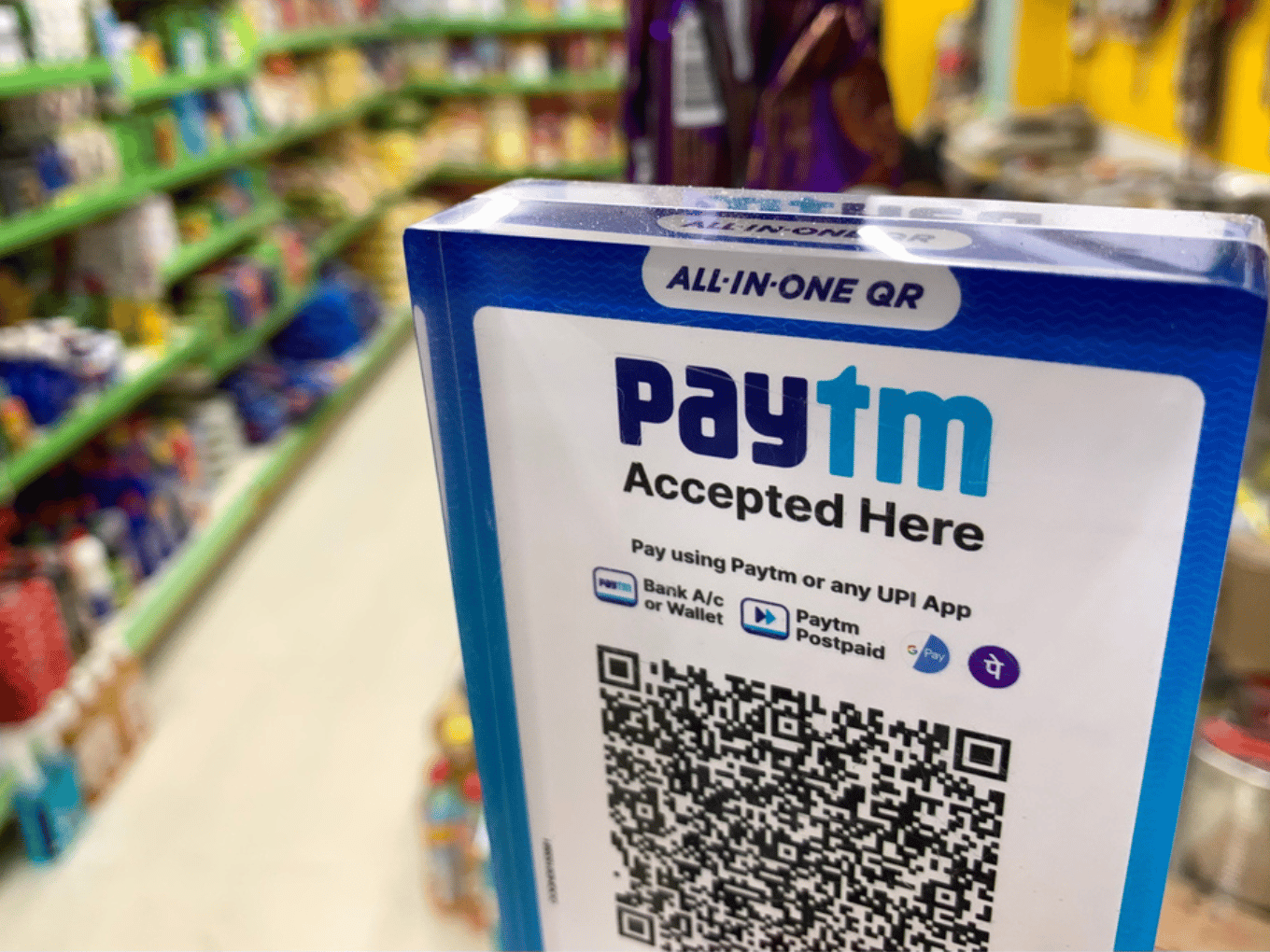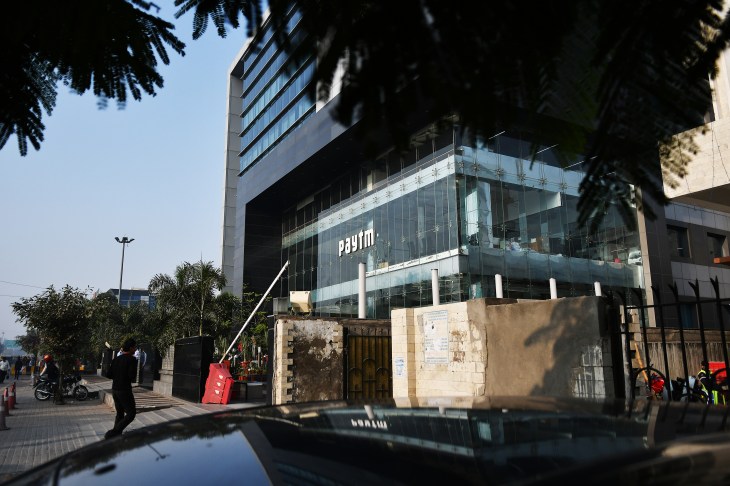Paytm Shares Hit All-Time Low; Market Cap Below 2016 Valuation

On the BSE, Paytm stock hit an all-time low of INR 476.65.
Last week, the lock-in period for Paytm’s pre-IPO investors expired. As a result, one of the company’s major investors, SoftBank, sold 4.5% of its stock in the business.
Shares of fintech behemoth Paytm hit their record low of INR 476.65 on the BSE during intraday trading on Tuesday (November 22), plunging as much as 11%. Jio Financial Services, according to a report from brokerage Macquarie, could pose a risk to fintech business models, including Paytm.
Last week, the lock-in period for Paytm’s pre-IPO investors expired as well. As a result, one of the company’s major investors, SoftBank, sold 4.5% of its stake in the new company in a bulk transaction for about $200 Mn.
Paytm shares were also trading at extremely high volumes of over 44K by 10 am IST. In addition, Paytm’s market cap, which is currently $3.8 billion, is lower than its 2016 valuation of $4.8 billion.
Even though a significant sell-off at Paytm was anticipated following the expiration of its lock-in, several brokerages recently reaffirmed their bullish outlook on the Vijay Shekhar Sharma-led company.
At least four brokerages, including BofA Global Research, Citigroup, and J.P. Morgan, increased their price targets (PTs) on Paytm after the company released its Q2 FY23 results earlier this month with a wider year-over-year loss of INR 571 Cr.
Goldman Sachs stated that the current share price “offers a new compelling entry point into India’s largest and among the fastest-growing fintech platforms” with a “buy” rating and PT of INR 1,000.
At 1.30 PM IST, Paytm shares were trading on the BSE for INR 482.95—more than 75% less than their INR 1,950 debut price.
Jio Financial Services could pose risks to Paytm, according to a report from brokerage Macquarie.

“Jio Financial Services will eventually manufacture the majority of its main product offerings, have a sizable balance sheet, and be asset-heavy, giving it a sizable competitive advantage… Both NBFCs and the business models of the fintech industry may be seriously at risk. Jio Financial not only has competitive rates in digital unsecured lending and merchant lending, the brokerage noted.
Reliance Industries Ltd. (RIL) announced last month that it would demerge its financial services business into Reliance Strategic Investments Ltd. (RSIL) and rename RSIL as Jio Financial Services Ltd. (JSIL). A non-deposit taking systemically important (ND-SI) non-banking financial company, RSIL is a fully owned subsidiary of RIL.
It should be noted that the current Reserve Bank of India (RBI) and also the National Payments Corporation of India (NPCI) are negotiating the implementation of a 30% market cap limit for UPI payment services provided by third parties.
In October, Paytm owned 11% of the UPI market. If NPCI moves forward with implementing the rules, Paytm may have a chance to overtake market leaders PhonePe and Google Pay in terms of market share.
A week after the lockup period for the Indian financial services company’s early backers expired last week and amid mounting concerns over escalating competition, shares of Paytm ended on Tuesday at an all-time low of 477 Indian rupees ($5.8).
On November 15, the lockup period for the main company’s earlier backers expired, allowing major investors like Alibaba and SoftBank Group to sell their shares. Last week, SoftBank sold shares for more than $200 million. (According to Indian law, pre-IPO investors must keep their shares after they are listed for up to a year after the IPO.)
Paytm’s shares are now trading at 476 Indian rupees, down more than 77% from their IPO price of 2,150 ($26.3). The company’s market cap is currently $3.8 billion, down from a private round valuation of $16 billion in 2016. More than $6 billion was raised by Paytm through private rounds and an IPO (including secondary transactions).
The market downturn this year has significantly reduced the value of tech companies by undoing many of the gains from the main previous 13-year bull run. Several Indian startups went public last year, including Paytm.
Some of the other startups that also have gone public in the last two years include Zomato, Policybazaar, Nykaa, and Delhivery; all of them are trading at prices that are significantly lower than their IPO prices.
Last week, Paytm’s founder, Vijay Shekhar Sharma, reassured investors that his company is “on the right path to the profitability and free cash flows.” The journey to create a scalable and lucrative financial services company has only just begun, he continued.
The decline in Paytm’s share price might also have an impact on India’s larger fintech startup ecosystem. According to Moneycontrol, PhonePe, a competitor of Paytm, is attempting to raise a current round from General Atlantic and also Walmart at a $12 billion valuation.
By the end of this current fiscal year in March, Paytm will have a revenue of $1 billion, according to Sharma.
Additionally, the price decline is timed with a report from the brokerage firm Macquarie that warns that Reliance’s expanding efforts to establish a financial services company could pose a “significant growth and also market-share risk for players like Bajaj Finance and also Paytm with whom it could be competing head-on.”

After advising clients to avoid Paytm at the issue price last year, Macquarie established a reputation for its target prices. Contrarily, a lot of other brokerages and wealth managers advised them to buy.
Comparatively, a Bernstein analyst predicted that the value of Paytm would fluctuate between $21 billion and $24 billion. (A request for comment made last year was not answered by a Bernstein spokesperson.) The analyst now focuses on cryptocurrency.
Announcing last month that it would separate and list its financial services, the Indian conglomerate claimed that this would enable the oil-to-telecom giant to expand into financial services like consumer and merchant lending and create fintech for “all Indians.”
The new unit, called Jio Financial Services, will be incubating, acquiring, and forming joint ventures, according to Mukesh Ambani’s Reliance Industries, which plans to expand its portfolio by adding insurance, payments, digital broking, and asset management.
Additionally falling by almost 10%, Paytm shares as Softbank looks to reduce stakes.
In Thursday’s opening deals on the BSE, shares of One 97 Communications Ltd (Paytm) fell about 10% to $541 per share as a division of Japan’s SoftBank Group Corp offered to reduce its stake in the business. According to information gathered by Bloomberg, 29.5 million shares, or 4.5% of the company’s equity capital, were traded on the NSE in a single block.
The transaction caused Paytm’s stock to plunge the most since July 29. According to reports published on Wednesday, Japan’s SoftBank will reportedly sell a third of its stock in One97 Communications Ltd, the main company that owns the Paytm payment app, in a $200 million block transaction.
According to a report by Mint on Wednesday, SoftBank, which owns 12.9% of Paytm, intends to sell 29 million shares, or 4.5% of the fintech company, on Thursday. Institutional investors can also purchase the shares for 555-601.45. If the sale goes through, SoftBank will receive at least $200 million, or 1,628.9 crore, according to the report.
The sale comes after Paytm’s pre-IPO investors’ one-year required lock-in period came to an end. After lock-ups expire, stocks frequently decline as a result of investor selling that puts pressure on share prices.
In the midst of the global tech slowdown that began last year, Paytm shares had made their stock market debut in November of last year.
Since going public, the share price has fallen by nearly 65%. Other recent technology companies that went public last year, such as Zomato, Nykaa, and PB Fintech, have also had difficult months thus far on the stock market and have already dropped below their respective issue prices.

Paytm’s net loss increased to $571 million in the July–September period from $473 million a year earlier, but it decreased from $650 million in the previous quarter of June 2022.
In the meantime, its consolidated revenue from operations increased by roughly 76% to 1,914 crore during the reported quarter, from 1,086 crore in the corresponding quarter of the previous fiscal, helped by acceleration in the lending business, a rebound in payment services to merchants, and an increase in cloud revenue.
In a letter to shareholders earlier this week, Paytm’s CEO Vijay Shekhar Sharma stated that the company is on the right track to profitability and free cash flows following recent quarterly reports that demonstrated strong operating leverage and a decline in EBITDA losses.




